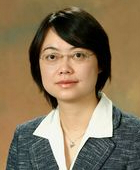
Examination of counterintuitive investor behavior has led to an award-winning study by three Naveen Jindal School of Management finance professors.
The trio investigated what they described as a “puzzling phenomenon.” Why, they wondered, despite the poor performance of actively managed mutual funds relative to their passively managed counterparts, the active funds continued to hold more assets.
Associate Professors Valery Polkovnichenko (who recently returned to the Jindal School of Management from an academic leave during which he worked at the Federal Reserve Board in Washington, D.C.) and Feng Zhao and Assistant Professor Kelsey Wei took home the Best Paper Award from the 2013 Asian Conference of the Financial Management Association International for their research.

About 180 papers were submitted to the conference, an annual event that this year met in Shanghai at Fudan University. About 75 of the submissions were presented to conferees. FMA’s competitive paper awards are based on a combination of reviewer scores from the initial paper evaluations and recommendations of the respective program’s track chairs.
Cautious Risk-Takers: Investor Preference and Demand for Active Management stood out in part because Polkovnichenko, Wei and Zhao took a new approach. While previous research had focused on fund-manager actions and fund performance, the JSOM trio looked at investor demand.
Studying a sample of U.S. domestic mutual funds between 1996 and 2008 to begin their investigation, they proposed that investors may be attracted to active funds when their preferences are sensitive to either downside risk or upside potential. The researchers also theorized that both risk aversion and risk-taking for the sake of gain play important roles in the demand for active management.

Polkovnichenko, Wei and Zhao expanded the knowledge base on the topic by demonstrating that actively managed growth and value funds may serve to capture upside potential and reduce downside risk, respectively. Specifically, flows into active growth funds are strongly influenced by investors’ preference for upside gain while flows into active value funds tend to respond more to investors’ demand for downside protection.
Having identified specific investor preferences as components behind the demand for actively managed funds, the study suggested that fund managers could use those preferences to “better structure their active portfolios to cater to different investor clientele.”
Their framework also included “different testable implications for growth versus value funds,” they wrote, and their results had new implications for the performance evaluation of active funds.

